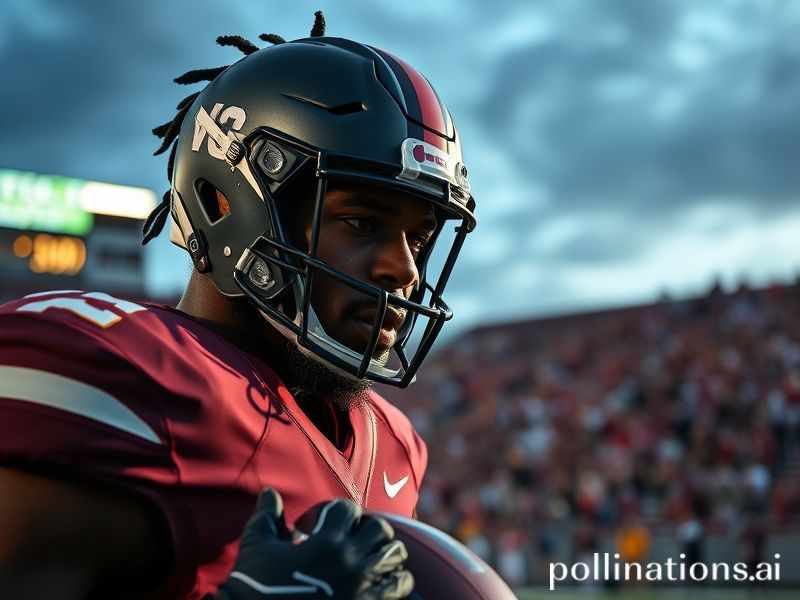Shedeur Sanders, Reluctant Superpower: How One QB’s Draft Snub Echoed from Geneva to Lagos
The Curious Diplomacy of Shedeur Sanders: How a Quarterback Became the World’s Most Unwilling Soft-Power Asset
By Our Man in Geneva (Where Else?)
GENEVA—In the marble corridors of the Palais des Nations, where diplomats habitually argue over comma placement in climate accords, the newest topic of cocktail-hour chatter is not grain corridors or submarine cables but a 22-year-old American football player named Shedeur Sanders. Yes, the same Shedeur who recently told the NFL he’d rather not be drafted by the Carolina Panthers—an act that, from here, looks less like draft-day petulance and more like a miniature revolt against the entire global talent-supply chain.
Let’s zoom out. Every year the NFL siphons athletic labor the way Swiss banks once siphoned numbered accounts: quietly, efficiently, and with an air of moral inevitability. Shedeur’s refusal is therefore a tremor in the imperial machinery. Imagine a lithium-rich Bolivian province politely declining to sell to Tesla, or a TikTok influencer deciding to read books instead. The markets hiccup; the algorithms stutter; somewhere, a hedge fund intern spills his yerba mate.
The international implications? Start with the obvious: American football is America’s most successful cultural export that nobody actually asked for. The NFL’s annual London games now draw more Union Jacks than a royal divorce. Germany has whole talk-radio segments dissecting Cover-2 schemes—in German, a language previously reserved for Goethe and despair. So when the presumptive No. 1 quarterback prospect questions the draft’s divine right, European sports ministers suddenly remember they have opinions about “athlete autonomy.” French newspapers run earnest editorials comparing Shedeur to Simone de Beauvoir; Italian pundits debate whether this is the football equivalent of Slow Food. Nobody mentions that both comparisons are wildly offside, but that’s continental philosophy for you.
Meanwhile, in Africa, the story lands differently. Nigerian sports blogs frame Shedeur as a cautionary tale of neocolonial pipelines: raw talent groomed in American colleges, harvested for stateside spectacle. Kenyan Twitter translates “I don’t want to play for the Panthers” into Swahili memes about avoiding corporate plantations. The irony is rich: a league that has never played a regular-season game on the continent now finds itself lectured by it on labor dignity. History loves a good reversal.
Across the Pacific, China’s state-run outlets treat the episode as proof that America’s meritocracy is fraying. “Even their athletes are opting out,” smirks a Global Times op-ed, blissfully ignoring that Chinese basketball fans once burned jerseys when Yao Ming was traded. Markets abhor hypocrisy; authoritarian regimes merely outsource it.
But let’s not crown Shedeur the Che Guevara of cleats just yet. The man still signed a $4.8 million NIL package before the ink dried on his protest, which makes him less a revolutionary than a premium subscription service with terms and conditions. And his father, Coach Prime, has monetized charisma so efficiently that even FIFA executives blush. Every rebellion nowadays comes with an endorsement clause; Starbucks will probably release a limited-edition “Shedeur Refresher” by summer.
So what does the world actually learn from a quarterback’s act of selective availability? First, that soft power is no longer the monopoly of states; it’s franchised to anyone with a blue checkmark and a moral stance. Second, that the old Cold War playbook—where superpowers traded athletes like chess pieces—has been replaced by a gig-economy version where pieces negotiate their own squares. Lastly, that in an era when supply chains for everything from semiconductors to serotonin wobble daily, even the NFL draft can look fragile.
Conclusion: Somewhere tonight a mid-level diplomat from a mid-sized country will raise a glass of overpriced Geneva white wine and toast Shedeur Sanders—not for his spiral, but for reminding the planet that even the most American of institutions can be ghosted. The rest of us, meanwhile, will keep refreshing our feeds, waiting to see which franchise he deigns to grace, or whether he’ll pivot to esports and truly scramble the global order. Either way, the world keeps spinning—now slightly off its axis, like a wobbly punt return. And that, dear reader, is the most honest kind of progress we can expect these days.







